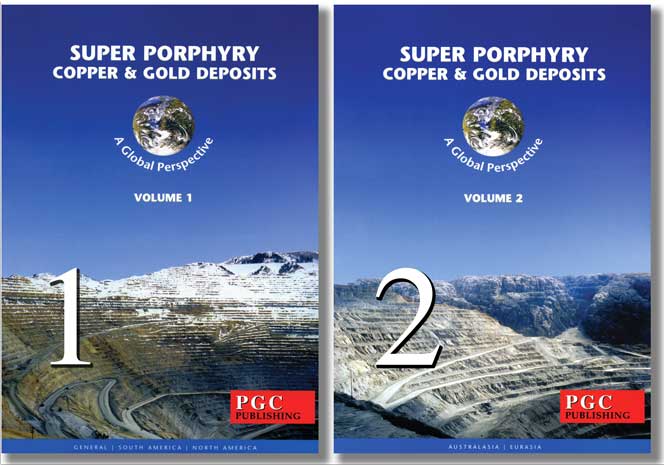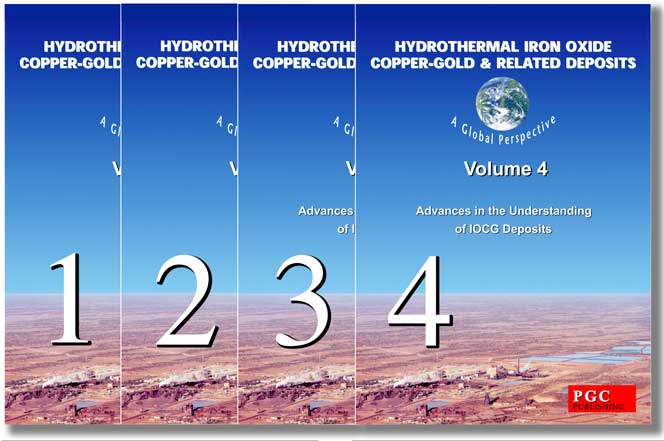|
Hercules |
|
|
Tasmania, Tas, Australia |
| Main commodities:
Zn Au Pb Cu Ag
|
|
 |
|
 |
 |
Super Porphyry Cu and Au


|
IOCG Deposits - 70 papers

|
All papers now Open Access.
Available as Full Text for direct download or on request. |
|
 |
The Hercules ore deposit is located 7 km south of Rosebery on the west coast region of Tasmania, ~190 km NW of Hobart and 95 km SSW of Burnie (#Location: 41° 50' 28"S, 145° 30' 55"E).
For details of the setting and district geology, see the Rosebery description.
The Hercules deposit is located on the eastern limb of a north-south trending anticline, and straddles the contact of a >500 m thick, regionally extensive, feldspar porphyritic unit, the Rosebery-Hercules Footwall Volcaniclastics unit of the Central Volcanic Complex, and an overlying interbedded black slate and volcanic sandstone unit, the up to 50 m thick Hanging Wall Black Slate. The black slates are conformably succeeded by approximately 50 m of quartz- and feldspar-rich sandstone of the White Spur Formation.
In the immediate mine area the host sequence is composed of the following from bottom to top:
• Footwall Pyroclastics - >300 m of fiamme bearing feldspar-phyric ash flow tuffs,
• Silicified volcanic breccia - 0 to 30 m thick,
• Grey to black shale and slate, the 'Host Rocks' pelitic to psammitic bedded ash flow tuffs - 20 to 100 m thick,
• Quartz-phyric lithic tuffs - 0 to 50 m thick,
• Feldspar-phyric lithic tuffs - >100 m thick.
The deposit consists of a series of small 70 to 80°E dipping lenses (designated A, B, C lodes etc.), about 100 x 100 m by 5 to 10 m thick, generally joined to their neighbour at some point. Most ore lenses are zoned, with mineralisation grading from sphalerite-galena-pyrite to pyrite and stringer chalcopyrite down-dip. The ore lenses are grossly stratabound in some areas, but at a high angle to lithological contacts elsewhere. The ore lenses have their long axes parallel to a strongly developed north-south cleavage within the host and footwall rocks. The Hercules mineralisation has an extensive (footwall) alteration
system of chloritised and pyritised pumice, and consists of pyrite, sphalerite, galena, electrum, tetrahedrite and chalcopyrite. The lenses contain a variety of textures and mineralogies, but all are composed of porphyroblastic sulphides of 2 to 10 mm sphalerite in diameter rimmed first by galena with minor chalcopyrite, then by a sericite or chlorite selvage.
The Hercules mine closed in 1999 after operating discontinuously for a century.
Historic production to 1996 was - 2.3 Mt @ 0.38% Cu, 5.5% Pb, 17.3% Zn, 172 g/t Ag, 2.8 g/t Au;
Historical production and remaining reserves at Hercules (Briggs and McNeill, 2005) total:
2.57 Mt at 16.7% Zn, 5.2% Pb, 0.42% Cu, 160 g/t Ag and 2.7 g/t Au.
Geologically, the Hercules South deposit is a continuation of the Hercules mineralisation, and comprises a disseminated to semi-massive, precious metal rich body which has been located 1 km along strike from the main Hercules deposits. This deposit is mainly sub-parallel to bedding, and comprises a lower sulphide rich facies and an overlying, interfingering carbonate facies. The sulphide facies is divided into an upper, gold rich pyrite ±barite stage, a siliceous ±stringer sulphide zone and a lower lensoid massive sphalerite-galena±pyrite zone.
Drill indicated resources at Hercules South in 1987 (Briggs and McNeill, 2005) were:
0.71 Mt @ 3.5% Zn, 1.9% Pb, 0.11% Cu, 147 g/t Ag, 2.7 g/t Au.
For more detail consult the reference(s) listed below.
The most recent source geological information used to prepare this decription was dated: 1997.
This description is a summary from published sources, the chief of which are listed below.
© Copyright Porter GeoConsultancy Pty Ltd. Unauthorised copying, reproduction, storage or dissemination prohibited.
Hercules
|
|
|
|
|
Aerden D G A 1993 - Formation of massive sulfide lenses by replacement of folds: The Hercules Pb-Zn Mine, Tasmania: in Econ. Geol. v88 pp 377-396
|
Burton C C J 1975 - Hercules and Farrell orebodies, Rosebery district: in Knight C L, (Ed.), 1975 Economic Geology of Australia & Papua New Guinea The AusIMM, Melbourne Mono 5 pp 626-628
|
Corbett K D 1981 - Stratigraphy and mineralization in the Mt Read volcanics, western Tasmania: in Econ. Geol. v76 pp 209-230
|
Corbett K D 1992 - Stratigraphic-volcanic setting of massive sulphide deposits in the Cambrian Mount Read Volcanics, Tasmania: in Econ. Geol. v87 pp 564-586
|
Eastoe C J, Solomon M, Walshe J L 1987 - District-scale alteration associated with massive Sulfide deposits in the Mount Read Volcanics, western Tasmania: in Econ. Geol. v82 pp 1239-1258
|
Gifkins C C, Allen R L 2001 - Textural and chemical characteristics of diagenetic and hydrothermal alteration in glassy volcanic rocks: examples from the Mount Read Volcanics, Tasmania: in Econ. Geol. v96 pp 973-1002
|
Green G R, Solomon M, Walshe J L 1981 - The formation of the volcanic-hosted massive sulfide ore deposit at Rosebery, Tasmania: in Econ. Geol. v76 pp 304-338
|
Lees T, Zaw K, Large R R, Huston D L 1990 - Rosebery and Hercules Copper-Lead-Zinc deposits: in Hughes F E (Ed.), 1990 Geology of the Mineral Deposits of Australia & Papua New Guinea The AusIMM, Melbourne Mono 14, v2 pp 1241-1247
|
Lees T. Khin Zaw, Large R R, Huston D L 1990 - Rosebery and Hercules Copper-Lead-Zinc Deposits: in Hughes Fe (Ed) 1990 Geology of the Mineral Deposits of Australia and Papua New Guinea The AusIMM, Melbourne v2 pp 1241-1247
|
Solomon M 1981 - An introduction to the geology and metallic ore deposits of Tasmania: in Econ. Geol. v76 pp 194-208
|
Solomon M, Eastoe C J, Walshe J L, Green G R 1988 - Mineral deposits and Sulfur isotope abundances in the Mount Read volcanics between Que River and Mount Darwin, Tasmania: in Econ. Geol. v83 pp 1307-1328
|
Zaw K, Large R R 1992 - The precious metal-rich South Hercules mineralization, western Tasmania: a possible subsea-floor replacement volcanic-hosted massive sulfide deposit: in Econ. Geol. v87 pp 931-952
|
|
Porter GeoConsultancy Pty Ltd (PorterGeo) provides access to this database at no charge. It is largely based on scientific papers and reports in the public domain, and was current when the sources consulted were published. While PorterGeo endeavour to ensure the information was accurate at the time of compilation and subsequent updating, PorterGeo, its employees and servants: i). do not warrant, or make any representation regarding the use, or results of the use of the information contained herein as to its correctness, accuracy, currency, or otherwise; and ii). expressly disclaim all liability or responsibility to any person using the information or conclusions contained herein.
|
Top | Search Again | PGC Home | Terms & Conditions
|
|